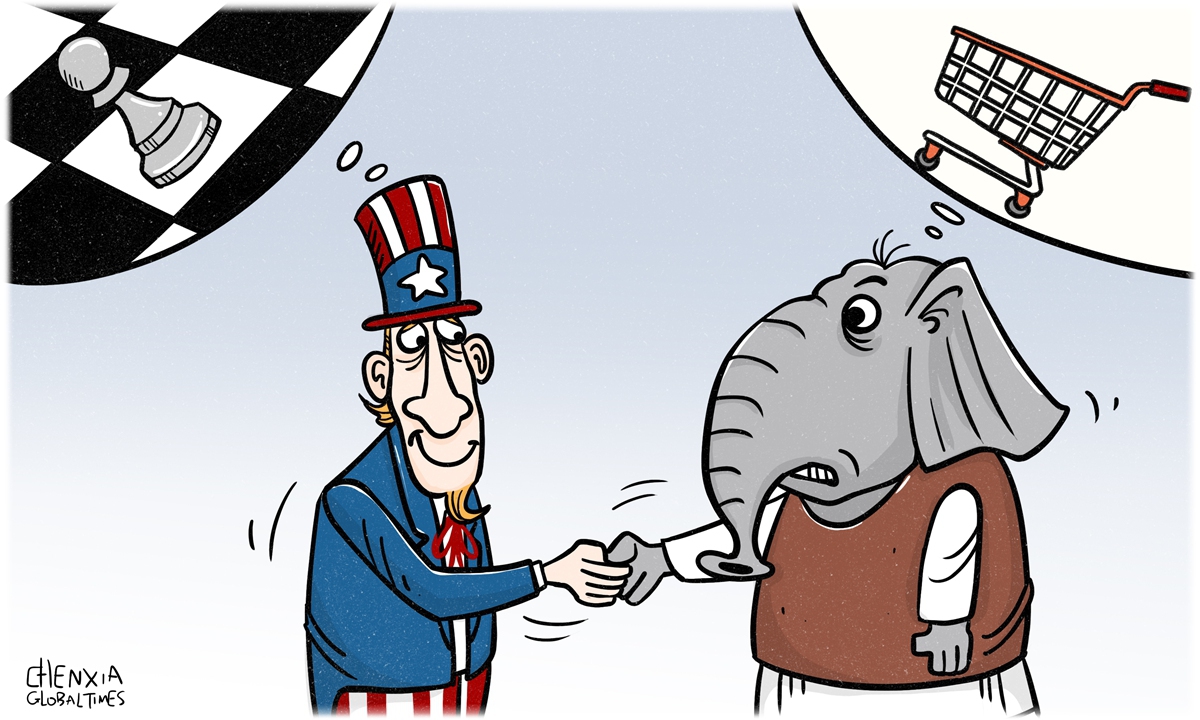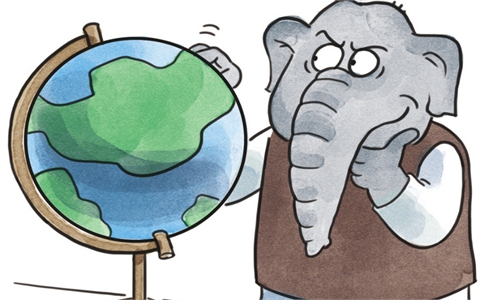
Illustration: Chen Xia/Global Times
After US President Joe Biden met Indian Prime Minister Narendra Modi at the White House on Thursday, the two heads of state issued a joint statement. In addition to cooperation in defense, chips, artificial intelligence, among others, are also included in US-India deals.In the joint statement, the US and India affirmed each other as "among the closest partners in the world," and Biden said that the US-India relationship was "one of the most defining in the 21st century." But will the US and India be able to work together for long? That's a question of doubt.
It is true that this time the US and India have reached agreements on various fronts, but many of these aspects of cooperation have been proposed before. Although the US and India have common grounds, they also have disagreements in many aspects.
The US wants to tie India to the chariot of containing China, and even hopes that India can become the vanguard of containing China. The US also hopes India can replace or partially replace China in the global industrial chain, thus it advances cooperation with India in some high-tech aspects. In addition, the US wants India to enhance its defense and military capabilities, especially along the Himalayas and in the Indian Ocean, as well as its intelligence capabilities, so as toexert greater pressure on China.
However, India doesn't want to be at the forefront of US attempts to contain China, nor does it want to serve as "cannon fodder" in the US-China tensions. On one hand, while the India-US joint statement covers various fields, the US actually only provides a few things to India, and not all at once, but in a phased manner. On the other hand, it is important to consider how much India can absorb and how much it can contribute to the US in accepting these favors.
Undoubtedly, it is a strategic game, and the US has been employing a "carrot and stick" approach toward India. This year, the US has already criticized the Modi government on human rights and other issues. The US-India cooperation is driven by self-calculations, without necessarily sharing so-called common democratic values.
According to Reuters, Modi did not mention China directly, and Biden only mentioned China when responding to a reporter's question. However, the joint statement made by the two sides, which refers to the Indo-Pacific region, the East and South China Seas and so on, appears to "take careful aim at China."
The US-India joint statement mentions the international law, particularly as stipulated in the United Nations Convention on the Law of the Sea(UNCLOS). This emphasis seems to reflect an Indian perspective rather than an American one. It is obvious that both nations have their own agendas in this regard as the US has consistently emphasized a "rules-based international order," which refers to an international order based on laws established by the US, and also because the US has not ratified the UN Convention on the Law of the Sea.
There is no doubt that both India and the US perceive China as a significant potential adversary in Asia and consider it the target of their strategic cooperation aimed at containment. Noticeably, this cooperation, particularly in the defense and military sectors, could pose a threat to the security and stability of the China-India border region, as well as the Himalayan region and the Indian Ocean. It can further complicate the situation along the border and undoubtedly become a major obstacle to China-India relations.
While high-tech development is necessary for a country like India, it is important to note that without a strong industrial base, the development of the high-tech industry lacks a solid foundation. For India, the most pressing need is to develop labor-intensive industries, and in this regard, a country like China can provide significant assistance.
China welcomes cooperation that promotes regional peace and security, and it hopes that relevant countries will establish a peaceful, democratic, open, and inclusive security architecture in the region. The focus should be on fostering cooperation rather than forming small cliques or camps that would undermine regional peace and stability.
The author is secretary-general of the Research Center for China-South Asia Cooperation at Shanghai Institutes for International Studies, a visiting fellow of the Chongyang Institute for Financial Studies, Renmin University of China, and a distinguished fellow of the China (Kunming) South Asia & Southeast Asia Institute. opinion@globaltimes.com.cn

